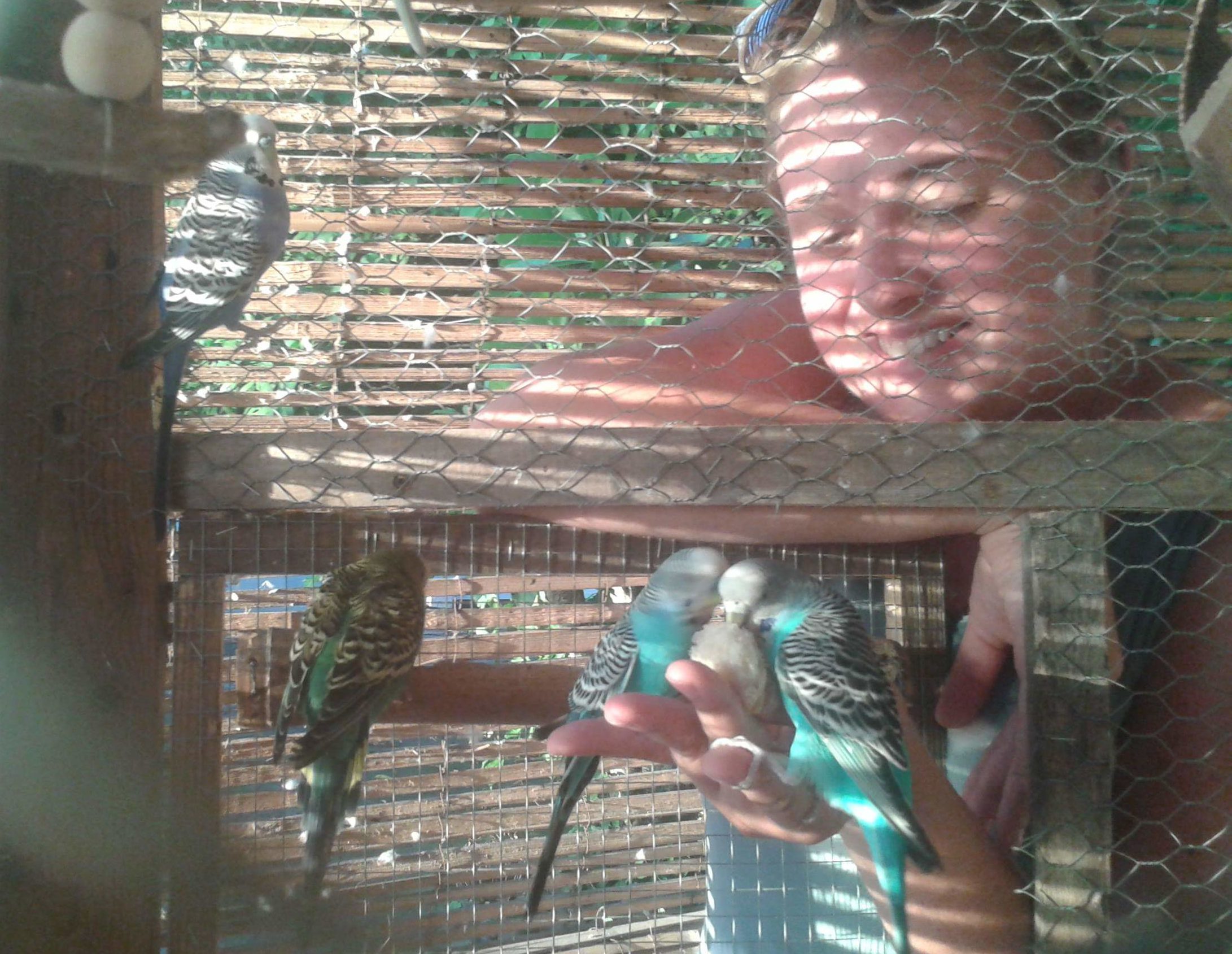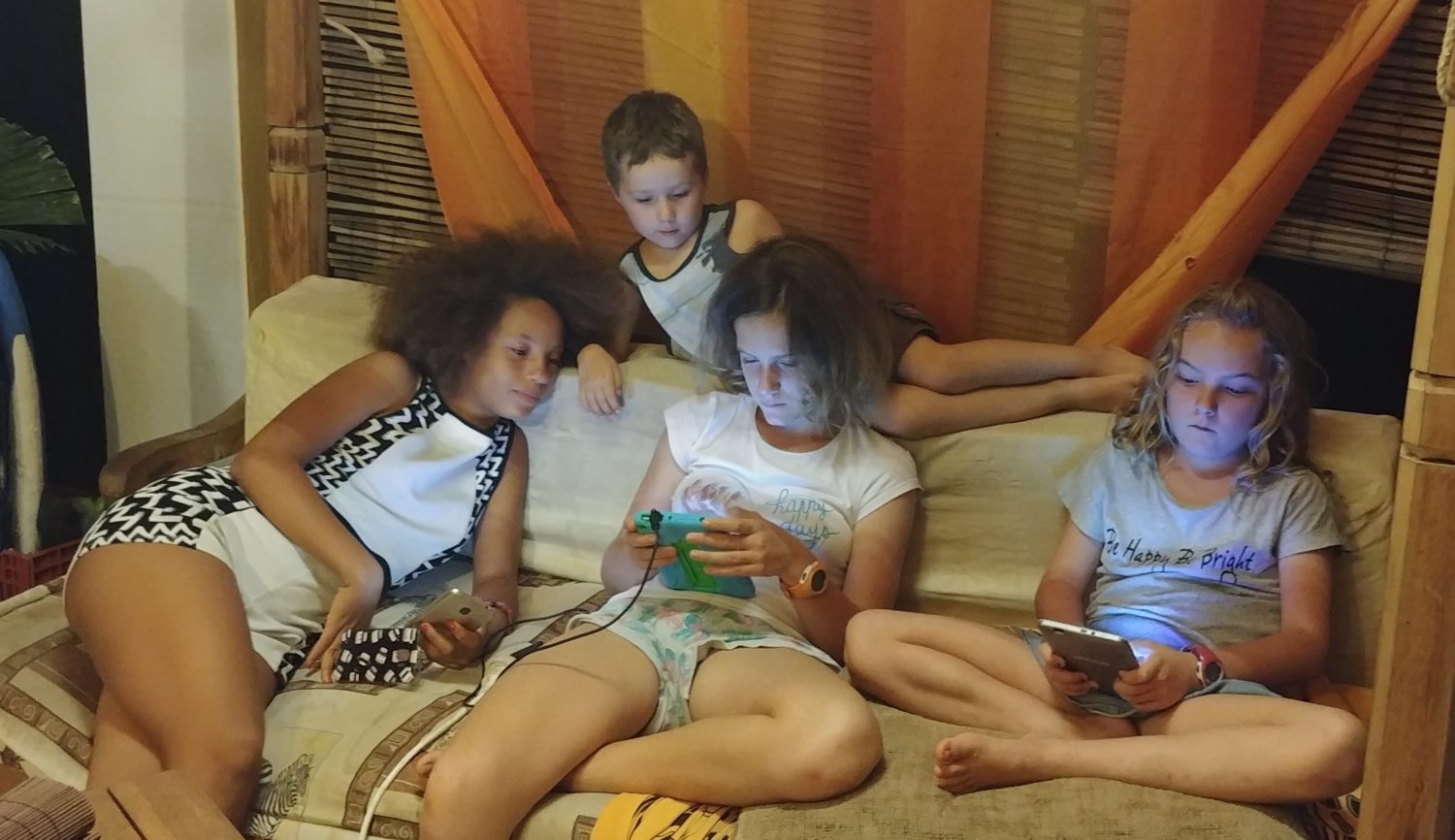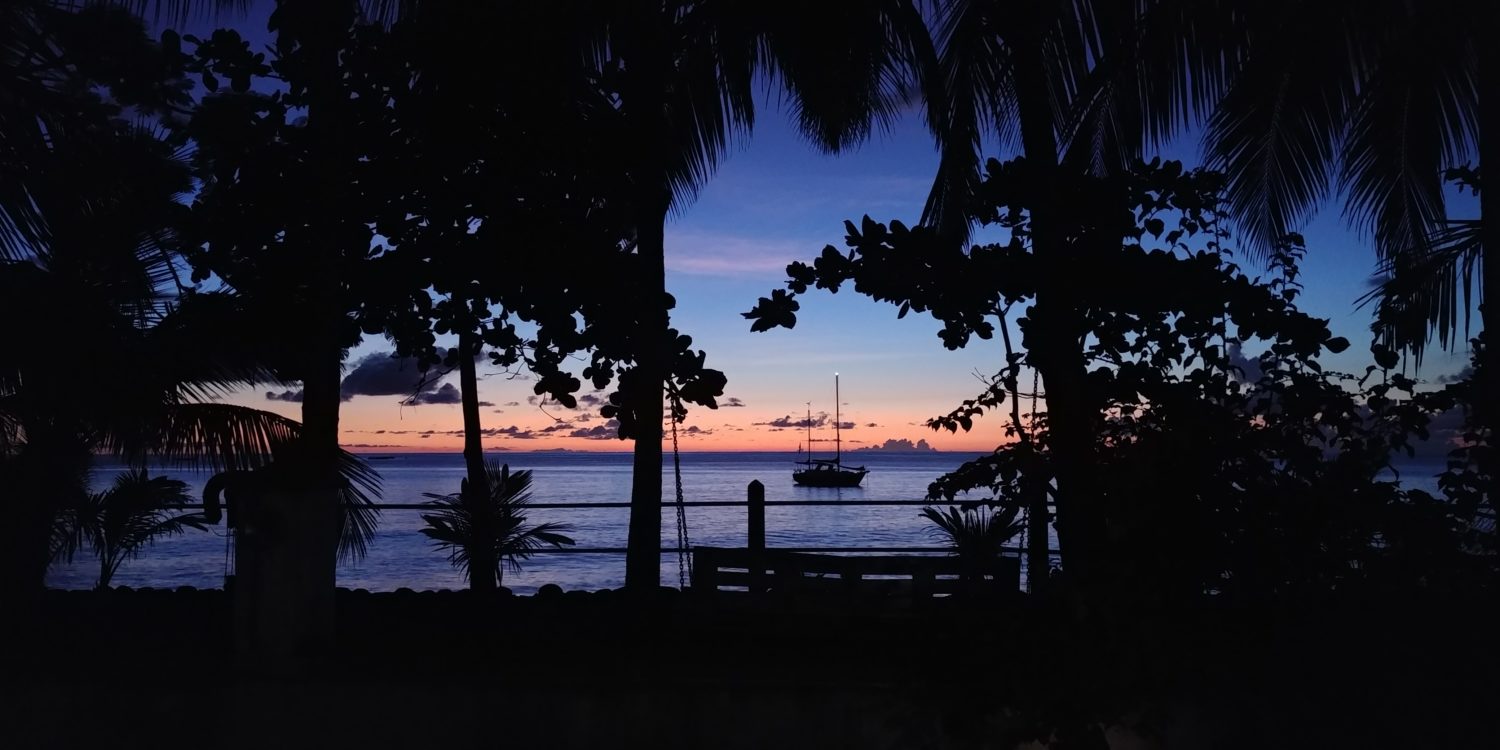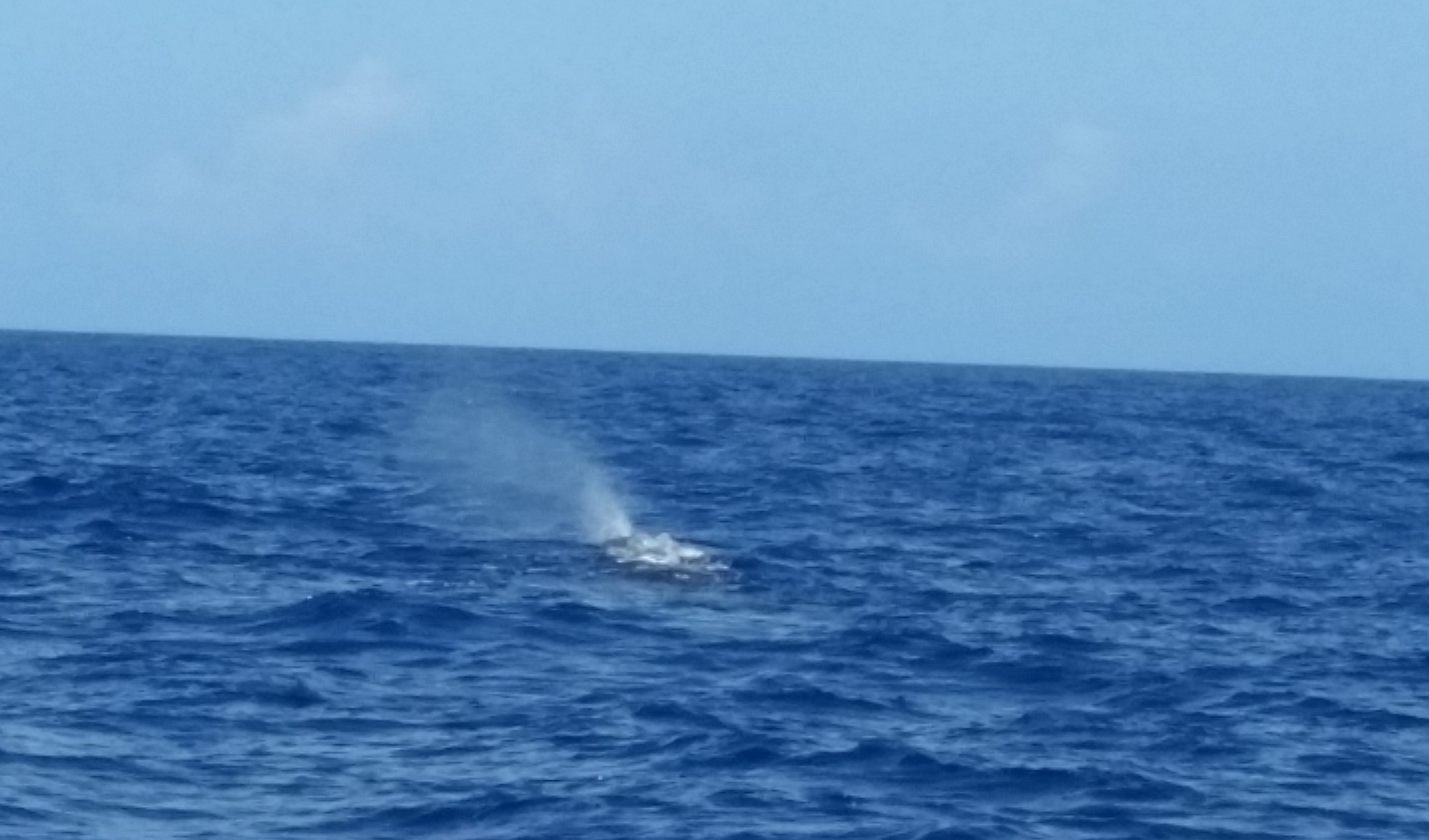Old Friends on a New Shore (Guadeloupe Landfall)
Pointe Noire, Guadeloupe
My first Caribbean carnival was on Dominica not long after hurricane Sandy swept the East Coast. Portsmouth afforded me a verdant, vertical wonder of waterfalls and cliffside gardens, and a swirl of people, colors, and sounds after my long year in flat, grey Norfolk. Anchored near me was Spellbound, crewed by a family from Martinique and other points further afield. French, German, Spanish and English were spoken aboard, and my daily row ashore soon had them as a regular stop. They extended an invitation just short of a demand that I visit them back at their home in Tartane after I had finished abusing my liver and wallet with carnival.
So I met with Matthias and Rebecca, their children, Rebecca’s father Bob, and his girlfriend Michele, as soon as my Dominica hangover had subsided enough to sail south.
Bob, Michele, and I subsequently disappeared into the Grenadines aboard Avalon. We planned to cruise for a couple weeks, but ended up voyaging for a month, causing some slight worrying back home with the family. But that is what cruising is: discarding plans and trying to assure loved ones left behind that you are well and happy.
I nearly ended up staying in Martinique upon our return. There have only been a handful of places in my travels for which I felt strongly enough to risk swallowing the anchor, and their windward village was certainly a bright candidate. It wouldn’t have been easy, as I’d have to quickly learn French and circumnavigate the circumstances of citizenship. But they strongly encouraged me to stay and try this life that attracted me so strongly. I nearly took that fork in the road, but an email from a friend requesting a rendezvous in San Juan (of all places!) ultimately shook me free of that quiet town before I could start seriously planning. I promised them I’d return to visit again soon, and six long years stealthily raced passed to leeward. They moved to Guadeloupe a few years back, and to an extent became shipwrecked on that lush shore.
It wasn’t long into this current voyage, just a couple months ago, that I received the text that Bob had passed away. Matthias asked for photos from our cruise of the Grenadines that he didn’t have and weren’t on this site anymore. As I worked to unearth them from the bowels of the server, I felt the press of time and grief, and the inevitably ephemeral quality of our lives, work, and dreams here on the islands. I wondered at the silly banal daily routines we employ strategically to inure ourselves to this certainty: “We’re here for a good time, not a long time.” These wise words I’ve heard from islanders more than once, on more than one island. But sometimes I ignore the admonition even while news of friends passing seems to arrive at a terrifyingly accelerating pace. I put my head down and push upwind through foul weather- both atmospheric, economic, and political. Why? What do I seek to prove?
I impart this inarticulately to Sara, even as news catches us that we lost yet another friend back in Vieques since we’d departed.
I want to be with my friends in Guadeloupe, and see an island spared somewhat by hurricanes, where my memories only touch briefly and are unlikely to be pained by stark changes and disassociation. It’s enough to mourn the absence of an old friend; too much to concurrently sift through torn up geography.
We motored in the massive lee of Guadeloupe nearly 20 miles and on this one occasion I am more than pleased we did. The direct route to Pointe Noire crossed the path of a whale spout. Sara once again flexed her prowess as a naturalist and identified it as a sperm whale, satisfied with the confirmation of its left-leaning spout of water. This is the first sperm whale any of us have seen. It stayed on the surface, spouting frequently, for 3 or 4 minutes, and just when we were beginning to wonder if it was injured or distressed, its flukes came up as it dove to abyssal depths, satisfied with its time basking at surface.
Seconds later, my cell phone received signal and welcome texts arrived from Matthias as he guided us to our anchorage.
“I’m holding up an orange life vest, do you see me?” He asked. The riotous mix of colors ashore eventually resolved and I picked out my old friend behind his seawall.
We idled past the float that marked the wreckage of their last boat and home in six fathoms, and where they later had scattered Bob’s ashes. Sara and I paused our usual landfall chatter. There lay volumes of memories mutely submerged beneath a humble yellow buoy close to port. The Caribbean is filled with such monuments, bearing silent testament to a few for a time, until the sweep of years and pass of storms inevitably wipe them away from the sea and living human memory alike. We are temporary here, and are constantly reminded of it. The weight of centuries blankets us until we join the past, ourselves becoming mere retellings of lost recollections.
Three young girls stood atop their old seawall tirelessly waving an oversized Jolly Rogers in fluttering sweeps to enthusiastically welcome us to their shore.
The shoreline in Pointe Noire at low water is a ten-foot-high, near-vertical shelf of huge round stones that could be employed for bowling.
“Who put all these here?” I asked Matthias.
“No one,” replied Matthias. “I wondered about that and asked someone who’s been here forever. They just roll down the river and pile up like that.”
“If Rommel had prepared Normandy with these, we’d all be speaking your language now,” I observed.
The stones are smooth enough and without hard growth to allow us to haul the dinghy up their steep incline. Keziah, Karla, and their friend Tatoum, who was on vacation from Martinique, greeted us in the morning and lit our way out with electric lanterns at night. The small mountain of “ankle-breakers,” as Sara called them, were a little more than a minor inconvenience.
Max was ecstatic to encounter these three friends here, near his age, who doted on him constantly, but in French.
“Shoopy-noo, Max, Shoopy-noo.” The girls chanted as they chased him, picked him up, and carried him away. Little Max at first looked at us helplessly; he’s too used to having adults listen to him with excruciating patience and understanding, and his responses in English were of little use. I shrugged. I don’t know what the hell they’re saying, dude. Though Rebecca assured us later that it meant something like “cutie.” They could have been discussing what seasoning to employ in cooking him for all I knew.
Although I met them in Martinique, their family had previously lived on this island, and Rebecca’s mother and sister still live nearby. Matthias once ran a restaurant somewhere near here – indeed he spent hours daily cooking for our large gang with some intimidatingly exotic cuisine. He greeted us with a pana souffle that was soul-inspiring.
“Was this a regular dish you served?” I wondered aloud between mouthfuls. He shrugged, crossing his arms.
“No, this is the first time I made this.”
French chefs – and at least one German I know – can casually prepare kingly meals without meat. His cuisine is mind-altering, although I sometimes suspect that he finds our vegetarianism left of eccentric. I struggle to explain how I lost my taste for flesh, and the (to me immediate) economic and environmental consequences of seafood, though they have quotas and licensing here that are actually enforced. Tropical fisheries are far more fragile than their northerly counterparts, and we don’t do a good job. There isn’t a Fisheries or law enforcement vessel in the waters of Vieques – even before the hurricane, except for some unscheduled transient police who scurry off soon after checking in.
As expected we find the hot Scotch Bonnet so easily grown here. But as with the rest of the Caribe, the French don’t like food spicy. Matthias pickles some of these peppers in escabecha (and graciously sends us back home with our own jar full), and introduces me to a very aggressively prepared paste sold commercially here (but not seemingly often used by local restaurants), and a tube of a Moroccan red curry-like paste. All of these spicy treats are met with actual screams from the three girls as I consume them.
The French Caribe are completely aligned with living a good life in context of family, food, health, socialization, and a plenitude of meaningful leisure and recreation. Time enough here to love. If you’re a citizen of the European Union, the basics are very easy to come by here. Beyond that, it requires vast amounts of work like every other island I’ve met.
Oh, the ubiquitous wine, wide-spectrum array of cheese (which sometimes seems consumed based strictly by mood), and the local agriculture! How I long to see our little island flex its dormant agricultural might as a modern tropical produce exporter. Ah, but the Jones Act, the way the US capriciously outsources to slave labor (especially sugar!) to save a penny on the dollar, the contaminated soil on the Vieques windward side, and the post-colonial hopelessness observing US mainland farmers receive outrageous subsidies to not produce, while the terms of our territory crush us with cheap, rotting imports.
The French protect and nourish their agriculture, their land, and their people – at least here in the Caribbean. Our notion of free-trade-Laissez-faire-capitalist-bullshit ideology rings hollow: results count. If you protect your agriculture and provide government social services, education, and healthcare as a priority, a better life and economy is what pops out of the vending machine. Still there are a few rich oligarchs way up in the hills out of sight of the working commoners, but who cares anyway? The surest way for the wealthy to protect themselves from the guillotine is for them to pay their fucking taxes like the rest of us. Why do they get this wrong every time? Do they think the rest of us don’t notice they’re cheating?
We are lulled from these thoughts on most days. Our friends manage properties for rent and for snowbird owners. We are intimately familiar with their trials and travails. Property managers are the worker bees of the Caribbean, the base of the economy for vacation rentals, the first people who see the money that actually comes ashore, after the absentee owners have pocketed their slice and stowed it, usually offshore. We depend on them in Vieques, as often they are the first to give the critical initial orientation to visitors. We receive a large portion of our passengers thanks to our friends that bear the brunt of leaving in the middle of a party, drink barely touched, to hurry to the tardy ferry to greet and deliver new guests to their rentals. This lifestyle requires a dexterity and cleverness of mind and hands.
The upshot of course is access to those houses, laundry machines, swimming pools, and often getting accommodations in an empty property, if they are willing to refurbish and maintain it during their employ. Matthias and Rebecca show us the before-and-after slideshow for their beachside home, converted from a dilapidated, abandoned restaurant. The images of careful hands laying masonry, banging out windows, painting murals, and constructing sturdy palette furniture and lawn toys for the kids, are all hauntingly familiar, but the timeframe leaves us astounded.
“You did this in two days?” I ask seeing pictures of the remodeled kids’ room.
“Well, most of it.”
“Even the fish pond?”

In one corner of the large open living space a cage of parakeets hangs. The budgies bicker, clack, peck, and generally enjoy each others’ company. Rebecca tells us that the little turquoise female adopted herself to the family recently, having flown down from a tree to light on the cage and wait patiently to be let in. She stayed mostly in her handmade Calabasa shelter during our visit, nursing her five new hatchlings.

Opposite the budgies, rocking on a palette-built swing-couch, the children bickered, clacked, pecked, and generally enjoyed themselves, immersed in alternate digital terrains, passing tablets back and forth. It’s hard to tell if the colorful birds, or their mammalian counterparts conversed more meaningfully, or which appreciated the vast spread of Caribbean sea lapping up just feet below more profoundly. Or maybe it’s the chickens as they sweep the ground outside their coops, or the cats, one of whom still misses living at sea, that stare into the unbroken blue line to the west and wonder what lies beyond. For me, I’m happy to spend a few minutes with my back turned to it, sipping wine and beer with my friends in the shade. Sometimes being ashore has some virtue. Don’t tell anyone I said this.
Matthias helps us to arrange a car rental, and mentions there are a couple of Belgians who live a short walk away who may be interested in sailing in a few days. We’re happy to have something to fill our unusually empty calendar…

